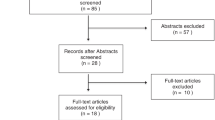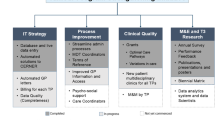Abstract
Background
Cancer multidisciplinary teams (MDTs) are well established worldwide and are an expensive resource yet no standardised tools exist to measure performance. We aimed to develop and test an MDT self-assessment tool underpinned by literature review and consensus from over 2000 UK MDT members about the “characteristics of an effective MDT.”
Methods
Questionnaire items relating to all characteristics of MDTs (particularly Leadership and Chairing; Teamworking and Culture; Patient-centred care; Clinical decision-making process; and Organisation and administration during meetings) were developed by an expert panel. Acceptability, feasibility and psychometric properties were tested by online completion of the questionnaire by 23 MDTs from 4 UK NHS Trusts followed by interviews with 74 team members including members from all teams and nonresponders. 10 of the MDTs also completed questionnaires that directly translated each characteristic to an item (for the five domains above) to test content validity.
Results
A total of 47 items were created, each rated for agreement on a 5-point scale. A total of 329 (52 %) of 637 team members completed the questionnaire, including representation from medical, nursing and clerical MDT members. Responses correlated well with domain-specific questionnaires (r > 0.67, p = 0.01), most domain-scales had acceptable internal consistency (Cronbach alpha > 0.60), and good item discrimination (majority of items r < 0.20). Team members were positive about its value.
Conclusions
Self-assessment of team performance using this tool may support MDT development.
Similar content being viewed by others
References
Saini KS, Taylor C, Ramirez AJ, et al. Role of the multidisciplinary team in breast cancer management: results from a large international survey involving 39 countries. Ann Oncol. 2011;23:853–9.
Kane B, Luz S, O’Briain DS, McDermott R. Multidisciplinary team meetings and their impact on workflow in radiology and pathology departments. BMC Med. 2007;5:15.
Taylor C, Munro AJ, Glynne-Jones R, et al. 2010 Multidisciplinary team working in cancer: where are we now? BMJ. 2007;340:c951.
Department of Health. Manual for cancer services. London: Department of Health; 2004.
National Cancer Action Team. National Cancer Peer Review Programme. Report, 2009/2010: an overview of the findings from the 2009/2010 National Cancer Peer Review of cancer services in England. London: National Cancer Action Team; 2010.
Lamb B, Brown K, Nagpal K, Vincent C, Green JSA, Sevdalis N. Quality of care management decisions by multidisciplinary cancer teams: a systematic review Ann Surg Oncol. 2011;18:2116–25.
Lamb BW, Green JSA, Sevdalis N. Decision-making in surgical oncology. Surg Oncol. 2011;20:163–8.
Davies AR, Deans DA, Penman I, et al. The multidisciplinary team meeting improves staging accuracy and treatment selection for gastro-esophageal cancer. Dis Esophagus. 2006;19:496–503.
Coory M, Gkolia P, Yang I, Bowman R, Fong K. Systematic review of multidisciplinary teams in the management of lung cancer. Lung Cancer. 2008;60:14–21.
Burton S, Brown G, Daniels IR, Norman AR, Mason B, Cunningham D. MRI directed multidisciplinary team preoperative treatment strategy: the way to eliminate positive circumferential margins? Br J Cancer. 2006;94:351–7.
Haward R, Amir Z, Borrill C, et al. Breast cancer teams: the impact of constitution, new cancer workload, and methods of operation on their effectiveness. Br J Cancer. 2003;89:15–22.
Lanceley AS, Savage J, Menon U, Jacobs I. Influences on multidisciplinary team decision-making. Int J Gynecol Cancer. 2008;18:215–22.
Kidger J, Murdoch J, Donovan JL, Blazeby JM. Clinical decision-making in a multidisciplinary gynaecological cancer team: a qualitative study. BJOG. 2009;116:511–7.
Leo F, Venissac N, Poudenx M, Otto J, Mourox J; Groupe d’Oncologie Thoracique Azureen (GOThA). Multidisciplinary management of lung cancer: how to test its efficacy? J Thorac Oncol. 2007;2:69–72.
Stalfors J, Lundberg C, Westin T. Quality assessment of a multidisciplinary tumour meeting for patients with head and neck cancer. Acta Otolaryngol (Stockh). 2007;127:82–7.
Blazeby JM, Wilson L, Metcalfe C, Nicklin J, English R, Donovan JL. Analysis of clinical decision-making in multidisciplinary cancer teams. Ann Oncol. 2006;17:457–60.
Lamb BW, Sevdalis N, Arora S, Pinto A, Vincent C, Green JS. Teamwork and team decision-making at multidisciplinary cancer conferences: barriers, facilitators, and opportunities for improvement. World J Surg. 2011;35:1970–6.
Vincent C, Moorthy K, Sarker SK, Chang A, Darzi AW. Systems approaches to surgical quality and safety: from concept to measurement. Ann Surg. 2004;239:475–82.
Hull L, Arora S, Aggarwal R, Darzi A, Vincent C, Sevdalis N. The impact of nontechnical skills on technical performance in surgery: a systematic review. J Am Coll Surg. 2012;214:214–30.
Hull L, Arora S, Kassab E, Kneebone RL, Sevdalis N. Observational Teamwork Assessment for Surgery (OTAS): content validation and tool refinement. J Am Coll Surg. 2011;212:234–43.
Undre S, Koutantji M, Sevdalis N, et al. Multi-disciplinary crisis simulations: the way forward for training surgical teams. World J Surg. 2007;31:1843–53.
McCulloch P, Rathbone J, Catchpole K. Interventions to improve teamwork and communications among healthcare staff. Br J Surg. 2011;98:469–79.
Lamb BW, Sevdalis N, Mostafid H, Vincent C, Green JSA. Quality improvement in multidisciplinary cancer teams: an investigation of teamwork and clinical decision-making and cross-validation of assessments. Ann Surg Oncol. 2011;18:3535–43.
Jamtvedt G, Young JM, Kristoffersen DT, Thomson O’Brien MA, Oxman AD. Audit and feedback: effects on professional practice and health care outcomes. Cochrane Database Syst Rev. 2003;(3):CD000259.
Taylor C, Ramirez AJ. Multidisciplinary team members’ views about MDT working: results from a survey commissioned by the National Cancer Action Team. London: National Cancer Action Team; 2009. http://www.ncin.org.uk/mdt.
National Cancer Action Team. The characteristics of an effective multidisciplinary team. London: National Cancer Action Team; 2010. http://www.ncin.org.uk/mdt.
Fleissig A, Jenkins V, Catt S, Fallowfield L. Multidiscpilinary teams in cancer care: are they effective in the UK? Lancet Oncol. 2006;7:935–43.
Abell N, Springer DW, Kamata A. Developing and validating rapid assessment instruments. Oxford: Oxford University Press; 2009.
Spector PE. Summated rating scale construction. London: Sage Publications; 1992.
Cortina JM. What is coefficient alpha? An examination of theory and applications. J Appl Psychol. 1993;78:98–104.
Taylor C, Brown KB, Sevdalis N, Green JSA. Developing and testing a novel, evidence-based and user-tested toolkit for assessing and improving teamworking in multidisciplinary cancer teams (abstract). Paper presented at: European Cancer Congress Stockholm, September 25, 2011. http://new.ecco-org.eu/ecco_content/StockholmAbstractbook/index.html.
Yun GW, Trumbo CW. Comparative response to a survey executed by post, e-mail, and Web form. J Comp Mediat Commun. 2000;6(1).
Acknowledgment
We thank the team members who participated in the development and testing of TEAM (as part of testing MDT-FIT) and the Trust personnel who facilitated their involvement; other affiliate members of Green Cross Medical Ltd who have supported this work; and the NCAT MDT Development steering group and subcommittee members for their input and comments. Supported in part by the NCAT. Sevdalis, Brown, and Lamb are also affiliated with the Imperial Centre for Patient Safety and Service Quality, which is funded by the National Institute for Health Research (NIHR).
Author information
Authors and Affiliations
Corresponding author
Rights and permissions
About this article
Cite this article
Taylor, C., Brown, K., Lamb, B. et al. Developing and Testing TEAM (Team Evaluation and Assessment Measure), a Self-assessment Tool to Improve Cancer Multidisciplinary Teamwork. Ann Surg Oncol 19, 4019–4027 (2012). https://doi.org/10.1245/s10434-012-2493-1
Received:
Published:
Issue Date:
DOI: https://doi.org/10.1245/s10434-012-2493-1




